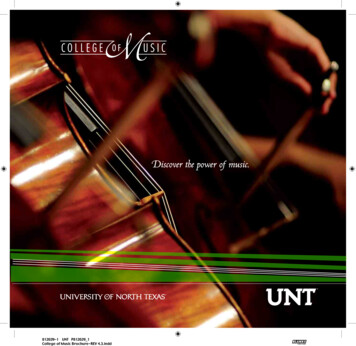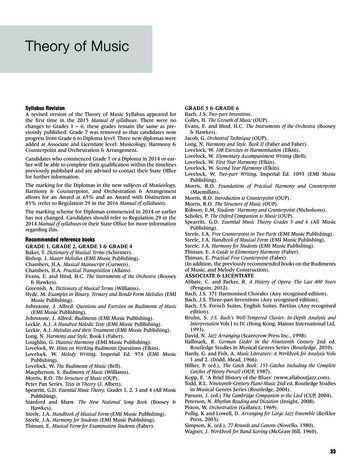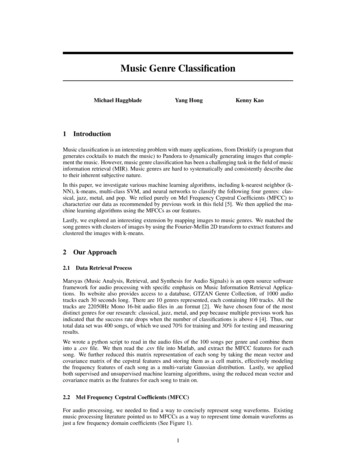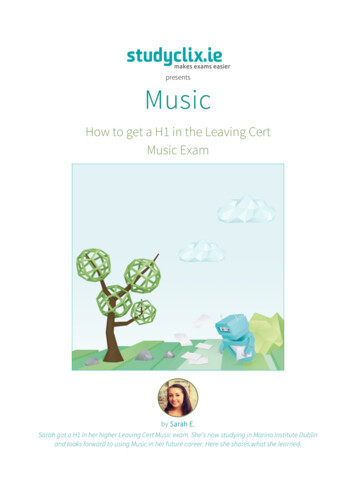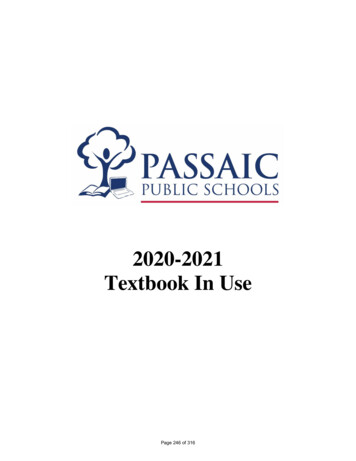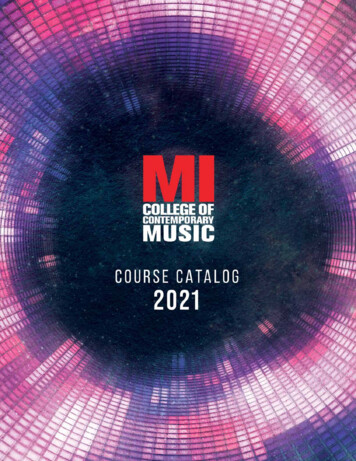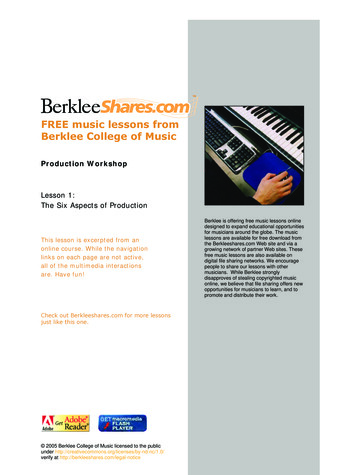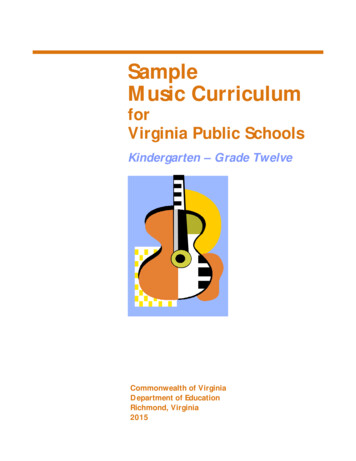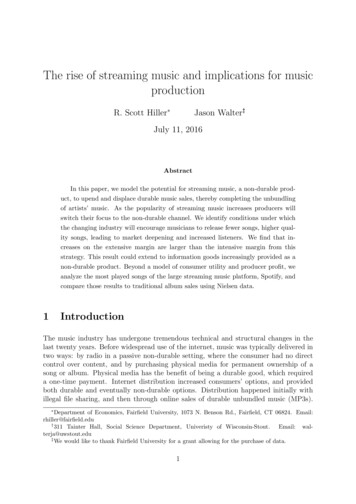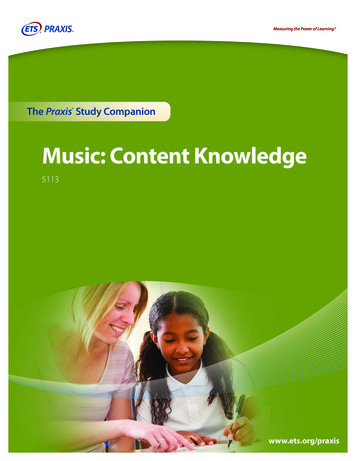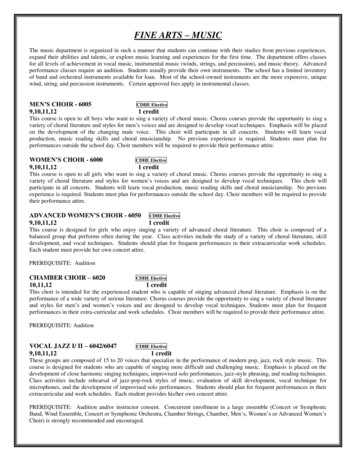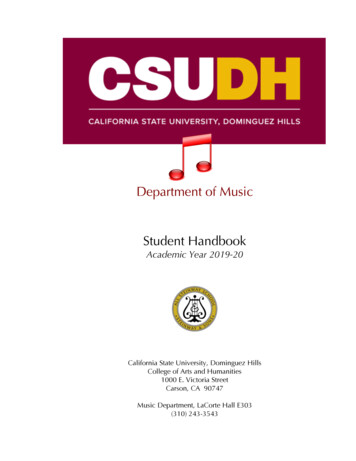
Transcription
Department of MusicStudent HandbookAcademic Year 2019-20California State University, Dominguez HillsCollege of Arts and Humanities1000 E. Victoria StreetCarson, CA 90747Music Department, LaCorte Hall E303(310) 243-3543
TABLE OF CONTENTSI. PREFACEII. MESSAGE FROM THE CHAIRIII. GENERAL INFORMATION1. Department of Music Office & Website2. Faculty Contact Information3. Degree OptionsA. General MusicB. Music PerformanceC. Music Education4. Special Degree CriteriaA. Major Performance ActivitiesB. Chamber EnsemblesC. Recital Attendance RequirementIV. AUDITIONS, EXAMINATIONS & ADVISING, ATTENDANCE1. Pre-Registration Requirements2. Applied Music Auditions3. Ensemble Auditions4. Musicianship Placement Examination5. Piano Proficiency Examination6. Music Theory Placement Examination7. Advising8. AttendanceV. APPLIED MUSIC STUDY1. General Information2. Applied Juries3. Transfer of Applied Music Credits/Units4. Applied Level Rating5. Applied Leave of Absence6. Lesson Time and Day7. Lesson Length8. Individual Lessons Absence Policy9. Change of Applied InstructorVI. STUDENT RECITAL PROCEDURES & GUIDELINES1. Recital Types and Definitions2. Recital Performance Requirements3. Recital Scheduling4. Degree Recitals5. Recital Program Requirements and Formatting-1-
VII. FACILITIES & RESOURCES1. Instruments, Lockers & Practice RoomsADDITIONAL RESOURCESA. Applied Music StandardsB. Standards for Keyboard Proficiency1. Keyboard Proficiency for Music Education and General Music2. Keyboard Proficiency for Music Performance (non-pianists)C. Placement Examination Study Guides1. Music Theory2. MusicianshipD. Recital Program Examples and TemplatesE. Health and Safety-2-
I. PREFACEThe course requirements for the Bachelor of Arts (B.A.) in Music from CSU DominguezHills are stated in the University Catalog. This Handbook, the University Catalog,University and Department advisers, and course syllabi, make up the tools you will needto progress towards graduation at CSUDH. It is the student’s responsibility to understandall degree requirements.Each student assumes responsibility for academic progress by keeping an up-to-daterecord of courses taken and by checking periodically with their Department of Musicadviser. Responsibility for errors in program or in interpretation of regulations ofCSUDH rests with the student. Advice is always available upon request from theDepartment of Music or the Student Success Center (SSC).-3-
II. MESSAGE FROM THE CHAIRThe Department of Music at CSU Dominguez Hills offers programs leading to the degreeof Bachelor of Arts in Music with options in Performance (including all instruments,voice, conducting, and composition), General Music, and Music Education.The Music Program is accredited by the National Association of Schools of Music(NASM) and is distinguished by the wide range of possible experiences it offers thestudent including: performance, composition, conducting, music history, world music,Dalcroze Eurhythmics, music for the theater, jazz, commercial music, and gospel.We are currently in the process of updating our program. The B.A. in Performance willbe replaced by a Bachelor of Music degree with four areas of emphasis: InstrumentalPerformance, Vocal Performance, Composition, and Contemporary Music. Thishandbook will be updated as needed.The Department of Music is an All-Steinway school and was the first public university inCalifornia to earn this distinction.Dr. Scott Morris, DMAProfessor and ChairThe CSUDH Department of Music-4-
III. GENERAL INFORMATION1. Department of Music Office and WebsiteThe Department of Music Office is located in LaCorte Hall E303. The Departmentwebsite can be found online at www.csudh.edu/music/2. Faculty Contact InformationDr. Scott Morris (Department Chair and Supervisor of Guitar Studies)Email: ssmorris@csudh.eduDr. Teodross Avery (Jazz & Contemporary Music)Email: teavery@csudh.eduDr. Dawn Brooks (Supervisor of Vocal Arts)Email: dbrooks@csudh.eduDr. Jonathon Grasse (Composition)Email: jgrasse@csudh.eduDr. Stephen Moore (Music Education & Piano)Email. sfmoore@csudh.eduDr. Rik Noyce (Supervisor of Classical Winds, Brass & Percussion)Email: dnoyce@csudh.eduDr. Hal Weary (Music Industry)Email: hweary@csudh.eduAdditional Faculty (links to artist biographies and contact information is availableat www.csudh.edu/music/faculty ) Mary Au (Collaborative Piano) Julian Coryell (Contemporary Jazz Guitar) Dr. Mike Davis (Trumpet) Charles “Chuck” Dickerson (Supervisor of Special Ensembles) Matthew Greif (Classical and Contemporary Jazz Guitar) Dr. Chika Inoue (Classical Saxophone) David Isaacs (Classical Guitar)-5-
Kathleen Janert (Music Education and Brass)Joseph Mitchell (Percussion)Kai Narezo (Flamenco Guitar)Gregory Robinson (Low Brass)Dr. Kevin St. Clair (Voice)Dr. Kendra Allyn Vuk (Voice)Trevor Ware (Electric & Acoustic Bass)Anthony “Tony” White (Marching Band Techniques)Shirley Yamamoto (Flute)3. Degree OptionsA. General MusicThe General Music degree is a Liberal Arts degree in music. Students enrolled as GeneralMusic majors are required to take the Core music curriculum (see the University Catalogavailable at www.csudh.edu) but are limited to four semesters of Individual Instruction.The capstone project for General Music majors is the Senior Project (MUS 499). They arenot required to present a Senior Recital.B. Music PerformanceThe Music Performance option emphasizes the development of skills necessary for acareer as a professional musician, conductor, composer, or songwriter. For curriculumdetails please see the University Catalog available at www.csudh.edu.C. Music Education (single field major – no minor required)The Music Education option is a Professional Degree designed to train students to enterinto a career teaching music in K-12 schools. CSUDH is a single-subject waiver schoolauthorized by the California Commission on Teacher Credentialing (CCTC). Studentswho graduate with a degree in Music Education from CSUDH are not required to takethe California Subject Examinations for Teachers (CSET). Students may enter into theSingle Subject Credential Program in the College of Education upon graduation. Forcurriculum details please see the University Catalog available at www.csudh.edu.4. Special Degree CriteriaA. Ensemble RequirementMusic majors must be enrolled in at least one Large Ensemble during each semester offull-time residency, in which the student plays his or her principal instrument. Vocalistsmust be enrolled in a choral ensemble (University Chorus or Chamber Singers, byplacement) each semester. Guitarists must be enrolled in Guitar Ensemble each semester.Guitarists in the Commercial Music or Jazz/Contemporary tracks must be enrolled inGuitar Ensemble as well as Jazz Band. Pianists, composers, and other instrumentalistsmay elect any major performance group that is practical for them, in consultation withensemble directors.Part time students are required to participate in an ensemble during each semester thatthey take Individual Lessons. This means that if students take longer than four years to-6-
complete their degree, this requirement may raise the number of units that a studentneeds to graduate. Ensemble offerings may vary from semester to semester.The current major performance groups are: Chamber Music (MUS 170-470) – section 02 (Early Music Collegium) Chamber Singers (MUS 171-471) Jubilee Singers (MUS 172-472) Jazz Band (MUS 173-473) – section 01 Jazz Band (MUS 173-473) – section 02 (Pep Band) Band (MUS 175-475) Orchestra (MUS 176-476) University Chorus (MUS 177-477) Guitar Ensemble (MUS 178-478)Special considerationsStudents who have declared piano as their main area of applied study may take atotal of 6 units in 6 semesters of Piano Accompanying to count toward MajorPerformance Activities. Other units must come from the major performance groupslisted above. Check with the Department Chair for details.B. Recital Attendance RequirementMusic majors are required to enroll in Concert Music (MUS 100-400) and attend sixrecitals or concerts each semester they are enrolled for Individual Lessons and Repertoire,on which they are not a performer or participant. Concert reports for each event attendedmust be submitted to Blackboard in order to receive credit for Concert Music. Thisrequirement must be met in order to graduate.-7-
IV. AUDITIONS, PLACEMENT EXAMINATIONS, AND ATTENDANCE1. Pre-Registration RequirementsBefore registering for the first semester as an undergraduate music major, each studentmust complete placement examinations and auditions to determine the appropriateperformance levels in each of the areas listed below:A. Applied MusicB. Major Ensemble GroupC. PianoD. TheoryE. MusicianshipAuditions and proficiency examinations are not graded as pass/fail, but are designed todetermine one’s placement and performance levels within the Department of Music.First-time Freshmen (FTF) may forgo the proficiency examinations in Theory,Musicianship, and Piano and enroll directly in 100-level courses in those areas (MusicFundamentals/MUS 110, Intro to Musicianship/MUS 109), Beginning Piano I/MUS 181).The same is true for transfer students who know they will enroll in 100-level courses.2. Applied Music AuditionsIt is recommended that a student prepare for the placement examinations and auditionsas follows:Voice (classical)Incoming freshman vocalists should be prepared to sing two songs of contrastingstyle. An accompanist will be provided. Voice students wishing to transfer at the juniorlevel should present three songs of contrasting style, one of which must be an art song oraria in a language other than English. An accompanist will be provided. Questions aboutthe voice audition requirements should be directed to Dr. Dawn Brooks atdbrooks@csudh.edu.Piano (classical) - all memorized:Applicants to the Classical Piano Program must prepare: J.S. Bach: Prelude and Fugue (at least 3 voice) from Well Tempered Clavier Chopin: Etude (or equivalent) Classical Sonata (1st movement) OR 20th- 21st Century workQuestions about the piano audition requirements should be directed to Dr. StephenMoore at sfmoore@csudh.edu.Piano (jazz)Applicants to the Jazz Piano Program must prepare: Movement from a Classical Sonata, Chopin Etude, OR Bach Preludeand Fugue (memorized)-8-
Rhythm Tune and a contrasting styleQuestions about the piano audition requirements should be directed to Dr. StephenMoore at sfmoore@csudh.edu.Woodwinds and BrassTrumpet Applicants must prepare: Two solo pieces of contrasting styles. Example: Kennan Sonata for Trumpet,(movement I). Hummel Concerto for Trumpet (movement 2) Standard etude. Example: Charlier, Etude #2. Arban, Characteristic study #1 Orchestral ExcerptsMussorgsky - Pictures at an Exhibition, “Promenade”Respighi - Pines of Rome, offstage soloBeethoven - Leonore Overture, No. 3Saxophone (classical)Auditions can be played on alto, tenor, baritone, or soprano saxophone. All saxophonistsentering the saxophone performance program are required to play alto saxophone forindividual instruction.Two selections in contrasting style (separate pieces, movements from a single piece, orétudes)Select one solo and perform two movements: Henri Eccles/ Sigurd M. Rascher, Sonata (1st and 2nd movement, or 1st and 4thmovement) Paule Maurice, Tableaux de Provence (1st, 2nd, and 3rd movement, or 4th and5th movement) George Frederick Handel / Marcel Mule, Sonata No.1 (1st and 2nd movement)Technique Scales: major, minor, and chromatic (two or three octaves when applicable) Etudes: Two contrasting (fast-slow) selections from the Ferling 48 Studies orcomparable etudesNote: Saxophone auditions do not need to be played from memory. You may use sheetmusic for reference.Questions about the woodwinds and brass audition requirements should be directed toDr. Chika Inoue at cinoue@csudh.edu .Woodwinds (clarinet, oboe, and flute)Applicants must prepare:Two selections of contrasting periods/styles from the standard repertoire such as amovement from a standard sonata or concerto.Technique Major scales (two or three octaves when applicable) An unaccompanied etudeQuestions about the woodwinds and brass audition requirements should be directed toDr. Rik Noyce at dnoyce@csudh.edu .-9-
PercussionPrepare ten minutes of material previously studied.Questions about percussion requirements should be directed to Joe Mitchell atjmitchell@csudh.edu.Percussion (jazz) Demonstration of various styles such as swing, Latin, funk, brushes, etc. You will be asked to perform basic techniquesStrings (violin, viola, cello, double-bass, and harp)Applicants to the Strings Program must prepare: Two selections in contracting styles with or without an accompanist from thestandard repertoire Major and minor scales Standard etudeQuestions about the strings audition requirements should be directed to Dr. Scott Morrisat ssmorris@csudh.edu .CompositionStudents applying to the Composition option must submit two original, fully-notatedworks. Applicant must also supply an audio recording of submitted works. Traditionalrecordings, MIDI files, or video links are all acceptable. Noted scores should be mailedor emailed before the audition date to Dr. Jonathon Grasse at jgrasse@csudh.edu . Onceaccepted, composition students are also eligible for the New Century Music Scholarshipin Composition.Questions about the composition audition requirements should be directed to Dr.Jonathon Grasse at jgrasse@csudh.edu .SongwritingStudents applying for the songwriting lessons in the Commercial Music option mustperform two original songs while also demonstrating basic accompanying abilities on aharmonic instrument such as a keyboard or guitar.Questions about songwriting requirements should be directed to Dr. Teodross Avery atteavery@csudh.edu.Jazz/Contemporary GuitarStudents applying for degrees in Music Performance or Music Education with guitar (nonclassical) as their primary instrument must demonstrate the following skills at asatisfactory level before the start of their first semester of study: Play the following scales in steady rhythmic time with both straight eighth and“swing” eighth notes (two octaves): C major, A minor, G major, E minor, majorpentatonic, minor pentatonic Play basic major and minor chords related to a major key. EXAMPLE: C major CM, Dm, Em, FM, G7, Am, Bdim Perform two well-known tunes (jazz/pop/blues) in contrasting styles accompanied- 10 -
by backing tracks Demonstrate the ability read simple melodies Experience playing in a rock or jazz band and/or school orchestra/choir/band Some individual guitar instruction and a letter of recommendation from mostrecent teacherQuestions about the guitar audition requirements should be directed to Dr. Scott Morrisat ssmorris@csudh.edu .Classical GuitarApplicants must prepare: Two pieces of contrasting styles Giuliani’s “120 studies, Op. 1”, numbers 1-50 (do not need to be memorized) Segovia’s Diatonic Major and Minor Scales (sharp keys only)Questions about the guitar audition requirements should be directed to Dr. Scott Morrisat ssmorris@csudh.edu .3. Ensemble AuditionsFor details on auditioning for an ensemble group please contact the director of the group.The current list of current ensemble directors is:Chamber Music (MUS 170-470) – section 02Dr. Rik Noyce (dnoyce@csudh.edu) and David Isaacs (disaacs@csudh.edu)Chamber Singers (MUS 171-471)Dr. Dawn Brooks (dbrooks@csudh.edu)Jubilee Choir (MUS 172-492)Charles Dickerson (cdickerson@csudh.edu)Jazz Band (MUS 173-473) – section 01Dr. Teodross “Teo” Avery (teavery@csudh.edu)Jazz Band/Pep Band (MUS 173-473) – section 02Dr. Chika Inoue (cinoue@csudh.edu)Band (MUS 175-475)Gregory Robinson (grobinson@csudh.edu)Orchestra (MUS 176-476)Charles Dickerson (cdickerson@csudh.edu) Please note that this ensemble is offered as a joint partnership betweenCSUDH and ICYOLA (Inner City Youth Orchestra of Los Angeles) andrehearses off-campus.- 11 -
University Chorus (MUS 177-477)Dr. Dawn Brooks (dbrooks@csudh.edu)Guitar Ensemble (MUS 178-478)Matthew Greif (mgreif@csudh.edu) and David Isaacs (disaacs@csudh.edu)4. Musicianship Placement ExaminationThe Musicianship Placement Exam requires students to demonstrate a level ofmusicianship skills appropriate for a university graduate majoring in music. These skillsinclude sight-reading, dictation, and aural comprehension of the common elements ofmusic—rhythm, melody, harmony, timbre, texture and dynamics. Every graduatingstudent will be required to pass a musicianship proficiency examination or have a recordof at least two semester units of Advanced Musicianship Skills (MUS 309) with a gradeof B or better. Contact Dr. Stephen Moore for details at sfmoore@csudh.edu.5. Piano Proficiency ExaminationEvery graduating student will be required to pass a piano proficiency examination orhave record of at least two semester units of Advanced class piano (MUS 381, MUS 382)with a grade of B or better. Contact Mary Au for details at mau@csudh.edu. Standards forBeginning, Intermediate, and Advanced Piano may be found at www.csudh.edu/music.6. Music Theory Placement ExaminationThe student must demonstrate a level of knowledge of music theory appropriate toundertake upper division study in music. These skills include the ability to decode bothpitch and rhythmic notation in all clefs, the ability to construct and recognize major,minor, and modal scales, knowledge of proper four part diatonic voice leading. Receivinga grade of B or better in MUS 211 avoids the need to take the music theory placementexam. Contact Dr. Stephen Moore for details at sfmoore@csudh.edu.7. AdvisingStudents will be assigned an advisor based on their degree option or primary instrumentof study. Students are required to meet with their advisor at the beginning and end ofeach semester, and may request meetings when necessary throughout the year.8. AttendanceStudents enrolled in any Department of Music course (any course with a MUS prefix) areexpected to attend class regularly. Department of Music course instructors, ensembledirectors, and applied studio teachers will post specific attendance policies for each classin their syllabi, and students must familiarize themselves with these policies.- 12 -
V. APPLIED MUSIC STUDY1. General InformationAll music majors must declare (and carry on continuous study), with approval of theappropriate applied Area Supervisor, a principal performance medium from one of thefollowing:BassBass (jazz)BassoonGuitar (classical)Guitar onDrums (jazz)PianoPiano (jazz)Saxophone (classical)Saxophone (jazz)TromboneTrombone (jazz)TrumpetTrumpet (jazz)TubaViolaViolinVoiceVoice (jazz)French HornPlease note that students in the General Music Option are limited to four semesters ofApplied Music study. A General Music student wishing to continue in Individual Lessonsmust re-audition for the Music Performance or Music Education options in order tocontinue with private lessons.A student registered for Individual Lessons (MUS 180-580) and Repertoire (160-460) mustalso be enrolled in the following:A. A Major Ensemble Group (see Section IV.3)B. Concert Music (MUS 100-400)C. Other Music Courses (3 units minimum)Other music classes refer to any course with a MUS prefix. This requirement is normallyfulfilled by the academic music courses required for the B.A. degree (e.g. Music Theory,Music History, Musicianship, etc.).Residency RequirementThere is a minimum residency requirement for applied study. To graduate from CSUDHwith the B.A. in Music, students must have taken applied lessons at CSUDH for aminimum 4 semesters.2. Applied JuriesPerformance juries are held at the end of each semester. They are held for the principalpurpose of confirming performance level ratings (advancement or retention) and to- 13 -
provide the faculty with the opportunity to hear and observe the progress of each studentand supply them with feedback on their performance.The jury is composed of a minimum of three instructors. One adjudicator must be thestudent’s applied instructor, and another must be a member of the full-time faculty (FTF).In preparing for the jury, the student will have a repertory list showing specificrequirements for that year or semester of study (list is supplied by the Area Supervisor).The student will choose the first selection and a second choice will be made by the jury.A schedule of available times will be posted two weeks prior to the juries and the studentwill schedule his/her own time.3. Transfer of Applied Music CreditsBased upon the student's applied level rating as determined at the applied placementaudition upon matriculation at CSUDH, the student may transfer from another collegethe number of music credits/units the student would have earned as a CSUDH student.These credits/units may be fulfilled by courses other than applied music, with approvalby the Department Chair.4. Applied Level RatingUpon entry as a music major, a student is assigned a level rating ranging from 100 to 400for applied study. These levels, coinciding with registration numbers, are determined onthe basis of the performance ability demonstrated in the applied placement audition andgenerally conform to the following: Freshman 100Sophomore 200Junior 300Senior 400Please note that having the number of overall credits to qualify for a particular level as auniversity student does not guarantee the student will be assigned the same Applied Levelrating. The Applied Level rating is based on both overall units earned and musical ability.5. Applied Leave of AbsenceA student who returns to Applied Music Instruction after an absence of more than two(2) semesters may be required to perform an audition to determine an accurate currentlevel placement.6. Lesson Time and DayThe day and time of applied lessons will be arranged by mutual consent betweeninstructor and student. Students should contact instructors before the first day of eachsemester to arrange a day and time.7. Lesson Length- 14 -
The student will receive a one-hour lesson each week of the semester (holidaysexempted). Under the usual academic calendar, there will be a minimum of thirteenlessons each semester.Students majoring in music must enroll concurrently in Individual Lessons (MUS 180580) and Repertoire (MUS 160-460). Individual Lessons accounts for half of the one-hourlesson and Repertoire accounts for the other half.8. Individual Lessons Absence PolicyStudents are required to notify their private lesson’s instructor of any absence at least 24hours before the lesson. Individual instructors may have additional policies that aredetailed in their syllabi. An instructor is not obligated to make up an unexcused absence.In the event of an instructor absence, a make up lesson will be promptly scheduled.9. Change of Applied InstructorAssignment to a teacher is typically made for the entire academic year. Occasionally itmay be necessary to make changes because of faculty load, etc., and the right to changesuch an assignment at any time is reserved by the Department Chair. A student whodesires to change instructors must file a written request (form available in the MusicDepartment Office) for such change with the Department of Music Office. The requestmust include the following data:A.B.C.D.Signature of Current InstructorSignature of Requested InstructorReasons for Requesting the ChangeSignature of the Department ChairThe Department of Music Office will forward the request to the Department Chair andthe student will be notified in a timely manner of the Department’s decision on thematter.VI. STUDENT RECITAL PROCEDURES AND GUIDELINES1. Recital Types and DefinitionsRecital TypeStudio/Workshop PerformanceDegree RecitalDefinitionA recital performance scheduled by thestudent’s applied music instructor thatincludes other students from the appliedmusic instructor's studio. Theseperformances typically take place during theweekly Repertoire, Studio, or Workshophours scheduled by each instructor.A recital performance scheduled by the- 15 -
Ad Hoc Recitalstudent in coordination with their appliedmusic instructor that acts as publicverification of level 300 competency (juniorlevel) or level 400 competency (seniorlevel).A recital performance scheduled by thestudent that does not qualify as a NoonRecital, Studio Recital, or Degree Recital. AdHoc and Ensemble recitals do not counttowards a fulfillment of the recitalrequirement but are a valuable part of thestudent’s development as a musician.2. Recital Performance RequirementsFor a student to advance in level, the following minimum performance requirements mustbe fulfilled. Failure to fulfill these requirements will result in a delay of graduation untilall recital requirements are completed. General Music majors do not progress beyondlevel 200 without a successful audition for the Music Education or Music Performanceoptions. LEVEL 100: At least one performance during a studio/repertoire workshopLEVEL 200: At least two performances during a studio/repertoire workshopLEVEL 300: One Junior Recital or one Ad Hoc RecitalLEVEL 400: One Senior RecitalPlease note that the amount of participation required by students in weeklyStudio/Repertoire Workshops it is up to individual instructors and may vary from what islisted above.3. Recital SchedulingA. Studio/Workshop PerformancesStudio recitals are scheduled by applied music faculty.B. Degree RecitalsDegree recitals are scheduled by students in consultation with their applied music instructoraccording to the Degree Recital scheduling guidelines. Students planning a Degree Recitalmust follow the following steps:1. Register for MUS 493 (Recital) the semester before and the semester of the recital.2. Inform the Recital Coordinator of a date agreed upon by the student and theirinstructor, as well as two back up dates in case the recital hall is unavailable.3. Once a date is confirmed the Department of Music office should be informed forinclusion in the events calendar as part of the Senior Recital Series.4. The student must perform a pre-recital approximately 4 weeks before the recital.- 16 -
5. The program is to be typed by the student using the Senior Recital Template(available on the Department of Music website and the Senior RecitalCoordinator). The applied instructor must approve the program and formatting.6. Final program must be presented to the Senior Recital Coordinator for finalapproval – in hardcopy – no fewer than 5 weeks before the recital performance.If corrections are needed, the student must make them and return a correctedhardcopy within 48 hours to the Senior Recital Coordinator. Once approval isgranted, the student may proceed in making no fewer than 50 copies for theperformance. This print-ready, final copy of the program must also be presentedto the Pre-Recital Hearing Jury Panel at the hearing.7. Three copies of the final printed program must be given to the Music DepartmentAdministrative Assistant to be placed in the student’s permanent file.C. Ad Hoc RecitalsAd hoc recitals are scheduled by students, with instructor permission, according to hallavailabilityØ Departmental approval is required for recitals scheduled during academic breaksor during the summer, or at off campus locations.4. Degree Recitals and The Senior ProjectDegree recitals are required for Performance majors and are an option for MusicEducation majors. Students enrolled in the Music Education option should discuss allpossibilities with their private instructors.Requirements for junior- and senior-level recitals may be met as follows:1. A student must have achieved the appropriate proficiency level (300 for JuniorRecitals, 400 for Senior Recitals) before s/he may schedule a Degree Recital2. The student will perform a pre-recital of the entire program before a facultycommittee approximately 4-5 weeks prior to the date of the recital to ensureadequate preparation. The student will be notified of the date and time of the prerecital once the Degree Recital is scheduled. The pre-recital jury must include thestudent’s private instructor and at least one member of the full-time faculty alongwith an additional3. A print-ready copy of the Degree Recital program must be presented to eachmember of the faculty jury. The faculty jury will not sign the pre-recital form unlessthe program is ready to go to print. The current printed program template can befound on the Department of Music website.4. A student will pass the pre-recital if a simple majority of adjudicators agree, aswell as the student’s private instructor, that the performance is acceptable. Thesuccessful student will be notified within one week of the jury date, and theDegree Recital date will be officially confirmed.a. If a faculty member is serving as an accompanist for the pre-recital, theywill not be allowed to vote on the hearing outcome. Staff accompanists arealso excluded from voting.5. A student will pass the pre-recital if a simple majority of adjudicators agree, aswell as the student’s private instructor, that the performance is acceptable. Thestudent will be notified within one week of a failed pre-recital. If a student fails- 17 -
the pre-recital, they may request a second pre-recital to be presented no later thantwo weeks before the recital date. A student who fails a second pre-recital willhave their recital cancelled. They will then need to reschedule the recital for thesemester following the originally scheduled recital date. A rescheduled recitalmay not take place in the same semester as the originally scheduled recital.Junior Level: The junior (300) level requirements may be met by one solo performanceof at least 25 minutes. These requirements must be met in order for students to progressto level 400. Repertoire will be chosen in consultation with the student’s applied musicinstructor. Students p
Music Theory Placement Examination 7. Advising 8. Attendance V. APPLIED MUSIC STUDY 1. General Information 2. Applied Juries 3. Transfer of Applied Music Credits/Units . Guitarists must be enrolled in Guitar Ensemble each semester. Guitarists in the Commercial Music or Jazz/Contemporary tracks must be enrolled in Guitar Ensemble as well as .
